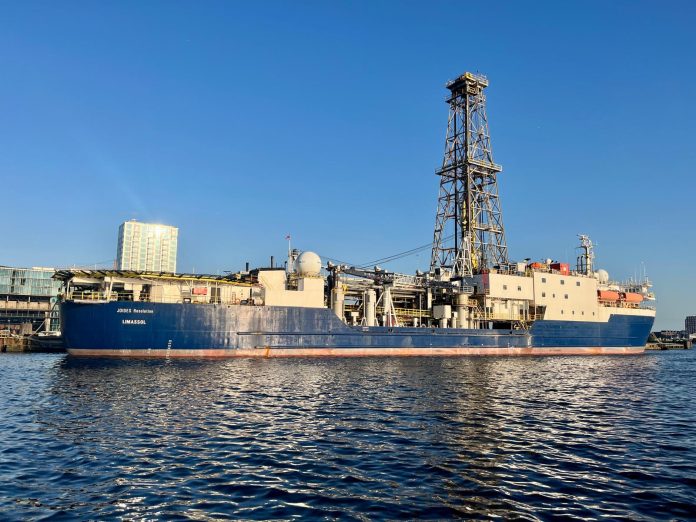by EH
The 403rd expedition of the International Ocean Discovery Program (IODP Exp-403) has set sail from the port of Amsterdam. Aboard the scientific drilling ship JOIDES Resolution, Renata Giulia Lucchi, a researcher from Italy’s National Institute of Oceanography and Experimental Geophysics (OGS), alongside Kristen St. John from James Madison University, leads the FRAME project, Eastern Fram Strait Paleo-Archive.
The expedition’s ambitious goal is to reconstruct the variability of the North Atlantic warm ocean current and its influence on climate change and the cryosphere from the late Miocene epoch, approximately 5.3 million years ago.
The Fram Strait stands as the only deep ocean passage for currents flowing between the North Atlantic and the Arctic Ocean. The North Atlantic warm current, flowing along the seabed on the eastern side of the Fram Strait, plays a crucial role in regional and global climate dynamics. This current influences, both historically and presently, the formation and melting of ice sheets and sea ice, as well as Northern Hemisphere ocean currents, thereby impacting global ocean circulation.
“Sediments have accumulated over millions of years along the western margin of the Svalbard Islands, forming bathymetric features known to geologists as ‘sediment drifts,'” said Renata Giulia Lucchi, OGS researcher and coordinator of Exp-403. “These deposits, shaped by the transport of the North Atlantic Current and contributions from marine biological activity and glacial movements, act as a natural archive of oceanographic and paleoclimatic changes.”
The FRAME project aims to gather samples from these sediment drifts to extract sedimentological, biogeochemical, micropaleontological, paleomagnetic, and microbiological data. This data will help reconstruct the history of interactions between the atmosphere, ocean, and cryosphere during past climate transitions, such as the onset of Northern Hemisphere glaciation and periods of rapid warming when carbon dioxide levels were higher than today.
“On our northward journey,” explained Lucchi, “we plan to drill at six main sites along the western margin of the Svalbard Islands, aiming to recover late Miocene samples from depths of up to 738 meters below the seabed. The data collected will be instrumental in building realistic climate models to project future temperature variations and the stability of current ice sheets.”
The FRAME project is underpinned by geological and geophysical data from the IRIDYA project of the Arctic Research Program (PRA), collected during the Arctic campaign of the icebreaker Laura Bassi, owned by the OGS.
“This expedition is a significant opportunity for the international scientific community and a notable recognition for our institute,” said Lucchi, noting that OGS is the only Italian research institute to have coordinated three polar expeditions of the international ocean drilling program ODP/IODP (two in Antarctica and one in the Arctic).
The International Ocean Discovery Program
The International Ocean Discovery Program (IODP) has been at the forefront of Earth Sciences research for over 50 years. Its mission is to investigate the Earth’s history, including ocean currents, climate changes, marine life, and mineral deposits, through the study of sediments and rocks beneath the ocean floor. These studies are conducted solely for scientific purposes, excluding energy resource exploration. The IODP’s operations are supported by the drilling ship JOIDES Resolution, capable of performing deep-sea drilling at depths exceeding 4,000 meters in oceans worldwide.
For further information on the campaign, visit: IODP Eastern Fram Strait Paleo-Archive.





























